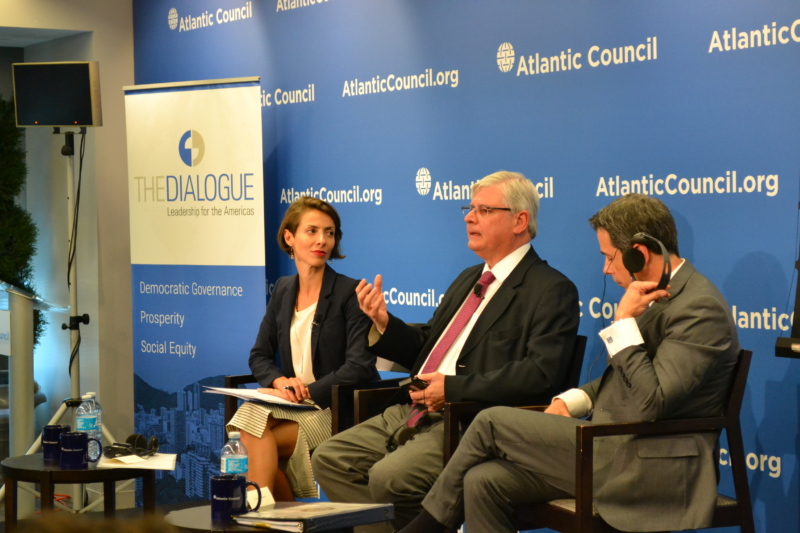Rising Brazil: The Choices Of A New Global Power
What should we expect from a newly powerful Brazil? Does the country have the capacity and leadership to be a central actor in addressing critical global and regional problems?
On July 19th, the Atlantic Council’s Adrienne Arsht Latin America Center, the Inter-American Dialogue, and Brazilian news service Jota invited Prosecutor-General of Brazil, Rodrigo Janot, and Acting Assistant Attorney General of the United States, Kenneth Blanco, to discuss corruption efforts between Brazil and the United States.
A panel of several experts followed the keynote address. This included Director of Investigations and Organized Crime Operations in the Brazilian Federal Police, Maurício Valeixo; Former Senior Prosecutor and Chief of the Foreign Corrupt Practices Act (FCPA) Unit in the US Department of Justice, Patrick Stokes; Partner and Senior Political Analyst of Jota, Fernando Mello, and Director of Abraji (Brazilian Investigative Journalism Association), Alana Rizzo. The event was hosted at The Atlantic Council, and Andrea Murta, Deputy Director of the Adrienne Arsht Latin America Center, moderated the discussions.
The keynote discussion started with Kenneth Blanco explaining the structure and work of the criminal division at the US Department of Justice and its cooperation with Brazilian authorities. Blanco called for global efforts against organized crime in a globalized economy. He recognized the FCPA as a smart policy that allowed transnational investigations and prioritized asset recovery, but he also praised Brazil’s commitment to the FCPA, transparency, and rule of law. In addition to the Odebrecht case, Blanco mentioned other corruption cases, including the Rolls-Royce bribery scandal, that both the US and Brazil have cooperated and worked on through sharing of evidence and mutual legal assistance channels.
"We have 158 active requests, 105 passive requests & cooperation has helped repatriate hundreds of millions of $" -Rodrigo Janot #ACBrazil pic.twitter.com/gWFP2q9FpU
— The Dialogue (@The_Dialogue) July 19, 2017
Rodrigo Janot enriched the discussion explaining the efforts of Brazilian authorities against corruption and the foundation of US-Brazil cooperation, which included better technical training and information sharing. Janot lamented how Brazil was experiencing three crises: an ethical, a political, and an economic one. However, the corruption investigations were independent from the political and economic crises. According to Janot, the law had to be applied to everyone, including politicians, and the investigations were not criminalizing politicians. Brazil has come far in the last 40 years and is now recognized for its judicial system and prosecutors. Corruption posed many challenges for Brazil and for the rest of Latin America, especially concerning the private sector’s ability to self-regulate, the national authorities’ commitment to regional, judicial cooperation, and the citizens’ frustration with corruption, which affected public safety, education, and other public services.
Blanco and Janot responded to multiple questions involving the political pressure to block the investigations in Brazil, the future of Brazil-US cooperation under the Trump administration, and the impact of the Lava Jato case on the judicial and political systems in Brazil and Latin America.
The event concluded with the second panel that further analyzed the issues raised in the keynote addresses. In addition, members of the panel shared data on the political support for Temer and anti-corruption efforts. They also discussed the changes in the Federal Police to focus on prosecutions and transparency of investigations, the evolution of the FCPA, and the role of the media in informing civil society.
What should we expect from a newly powerful Brazil? Does the country have the capacity and leadership to be a central actor in addressing critical global and regional problems?
President Lula da Silva triumphantly announced that he and his Turkish counterpart had persuaded Iran to shift a major part of its uranium enrichment program overseas—an objective that had previously eluded the US and other world powers. Washington, however, was not applauding.
An upcoming meeting between Presidents Obama and Rousseff should not be expected to produce dramatic news or unexpected major breakthroughs.
 Inter-American Dialogue / Ben Raderstorf
Inter-American Dialogue / Ben Raderstorf